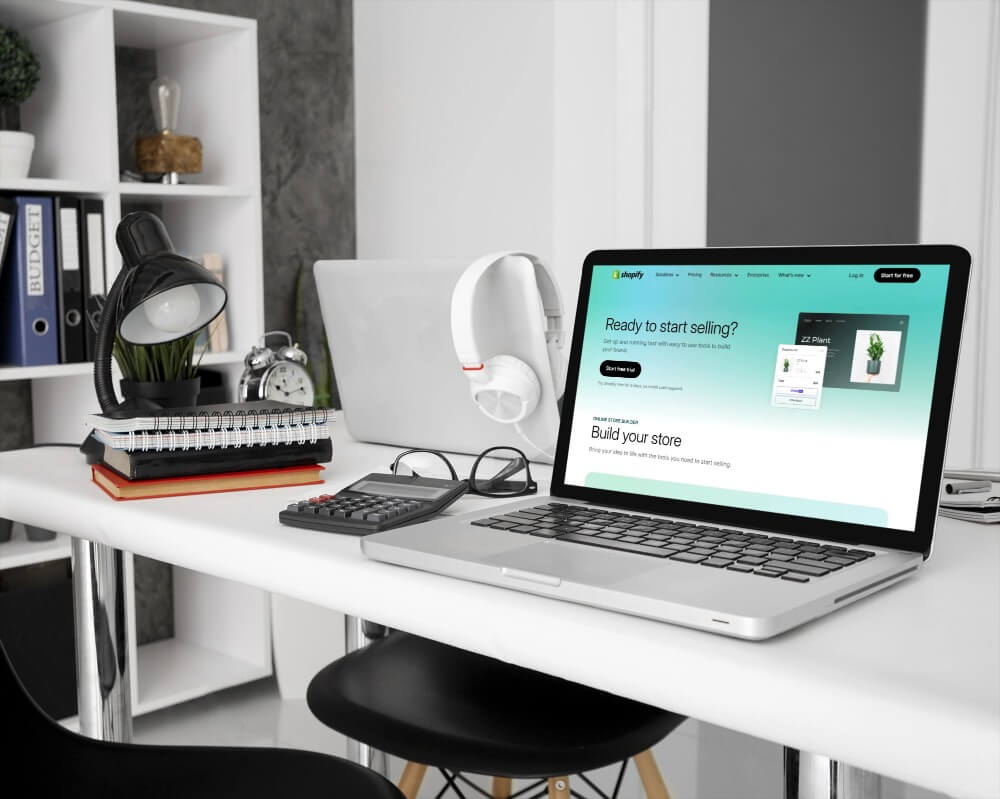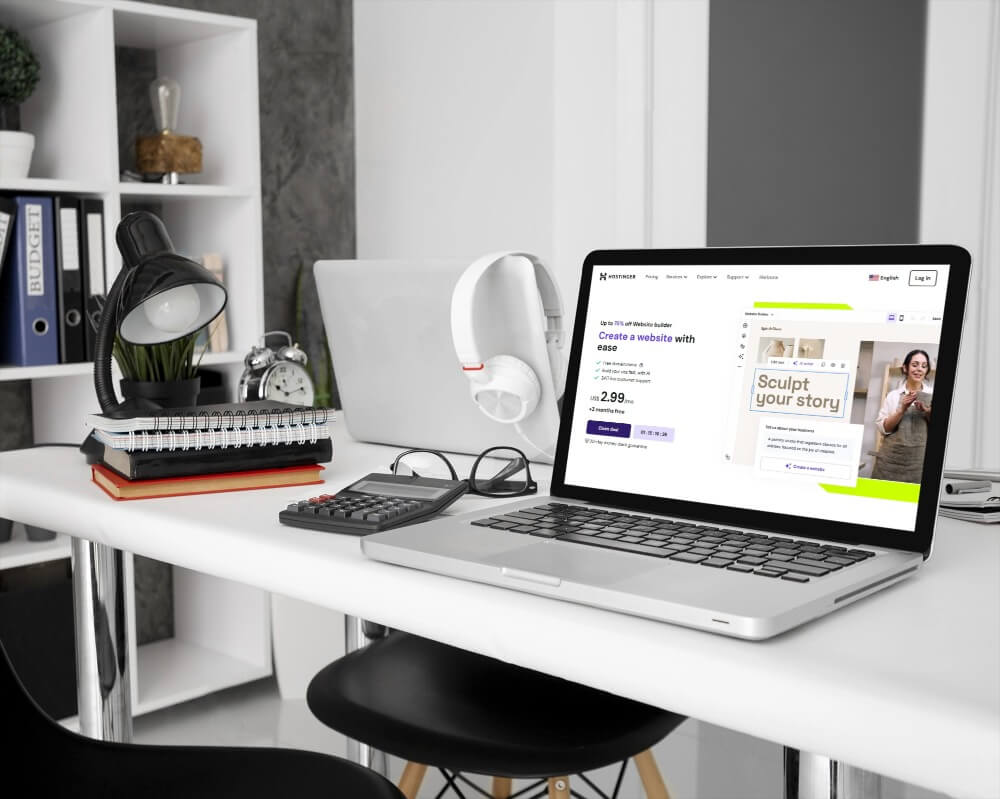Starting a business often means making baby steps. If the stars align, you’ll start as a small business, scaling up to mid-sized or large. However, you’ve set yourself up for failure if you don’t choose the best website builder for your small business. Do you want to know why?
Because every small business must have a website in 2025! Don’t expect people to run your way if you don’t present your services properly. For this reason, you’ll need a reliable small business website builder that offers associated features, while keeping the price in check.
Luckily for you, we tested dozens of them, and while many were great, we decided on the five most impressive picks. Below is our shortlist. However, you’ll get more value from our detailed reviews of the five best-rated website builders for small businesses. Let’s get to it.
5 Best Small Business Website Builders Ranked
- Wix — the best all-around small business website builder
- Squarespace — best for stylish website designs
- Shopify — an excellent option for selling online
- Hostinger Website Builder — an AI-driven beginner-friendly option
- Jimdo — a cheap small business website builder
Best Website Builders for Small Businesses: Detailed Reviews
We know you’re itching to learn more about our top five recommendations. Let’s not keep you waiting. Here are their features, pros, cons, and much more.
1. Wix

Pros
- Comprehensive sales tools
- 900+ site templates
- Marketing and SEO toolkit
- AI site-building prowess
- Wix has a free plan
- Support for collaborators
Cons
- Not the fastest hosting
- Unlimited storage is expensive
We recommend Wix as the #1 website builder for small businesses.
Glancing at our full Wix review, you’ll see why it’s so impressive. It offers various marketing features, such as built-in email marketing, many SEO tools, and a comprehensive e-commerce toolkit. Small businesses will appreciate Wix’s competitive prices in 2025.
The Light plan at $17 monthly is ideal for small businesses not looking to sell online. Conversely, the Core plan at $29 monthly is a great value, with a free domain, 50 GB of storage, and the ability to accept payments with low, 2.9% + $0.3 fees.
Wix’s AI implementation is enthralling. It permeates the entire experience from website building to SEO, keyword optimisation, and content creation. Wix offers over 900 beautiful templates, which you can use at the start. However, you can also let AI build a site for you.
Additionally, Wix features a no-code, drag-and-drop website builder to quickly set you on a path to success. As a website builder for a small business, Wix’s plans support collaborators. The Core plan supports five, which should be enough to meet your small business goals.
Wix can be a web hosting service for your blog and a reliable website builder for online sales. It’s highly competitive, even against Shopify, which appears to be a slightly superior option for e-commerce. Wix even offers a free plan, which you can use to test the service promptly.
If there’s one thing we’d complain about, it’s subpar hosting performance, which results in slightly slower load times. With proper website optimisation, this can be mitigated quickly.
2. Squarespace

Pros
- Stylish template design
- Many business-related features
- Simple-to-use site editor
- Up to 0% transaction fees
- Free domain for a year
Cons
- Constrained website editor
- Not many website templates
Squarespace is a famous website builder. It’s known for staggering template design, plenty of small business website builder features, and more. Let’s start with its price, though. Squarespace starts at $16 monthly, but our pick is the Business plan at $23 with e-commerce.
We love Squarespace because it includes business-specific features. For instance, it allows you to schedule appointments with the Acuity Scheduling tool. While an additional $16 monthly, it’s a worthy addition to every small business looking to carve its path to glory.
Compared to Wix, Squarespace offers roughly 200 templates. However, they’re stunning, with comprehensive categorisation that helps choose one more easily. Squarespace’s website editor is even simpler than Wix’s, so building a small business website without coding is a breeze.
Granted, Squarespace doesn’t leverage AI like Wix. However, it compensates with virtually essential features that Wix lacks. For instance, you can sell unlimited products, while Wix limits you to 50,000. As you see, Squarespace is also a bit less expensive than Wix.
At this price, you still get a free domain, advanced shipping options, customer accounts, contributions, professional Google email, and more. Squarespace is a popular website builder for small businesses that prefer stylish designs and maximum ease of deployment.
However, it doesn’t offer a free plan, and its editor offers way less freedom than Wix. It’s also not impressive for larger online stores requiring advanced inventory management. But if you’re a small business owner, Squarespace will perfectly satisfy your every need.
3. Shopify

Pros
- The best e-commerce platform
- Multi-channel selling
- Comprehensive app store
- Flexible subscription plans
Cons
- Overly reliant on apps
- Not the cheapest option
Shopify is a noteworthy website builder for a small business that emphasises e-commerce.
As the name implies, it’s all about selling online, putting aside complex website building and stunning templates from Wix and Squarespace. That’s not to say things are ugly! Shopify has excellent templates, over 200 of them, but the most beautiful ones are behind the paywall.
If that’s a hurdle you can scale, you’ve got yourself the best e-commerce platform. Shopify includes abandoned cart recovery, discount codes, customer accounts, automatic tax calculation, POS integration, customizable shipping, multi-channel selling, and over 100 payment gateways.
The great thing about Shopify is the small initial investment. It’s only $1 monthly for the first three months. Once that period expires, the Basic plan, at $19 monthly, is all you need. Its 2% transaction fees are lower than Wix’s, plus, you get all the online sales tools we mentioned.
Shopify is even more flexible than you might expect. It has an extensive app store to support your SEO, marketing, and content creation endeavours. While most of these apps are premium, they also offer free trials that allow you to test and use them freely for a while.
Shopify is designed as a website builder for smaller businesses, which also endorses scalability. As your business grows, you can upgrade to a higher-tier plan, get more features, and make more sales, provided you also have enough money to spend on it.
Apart from limited design freedom and higher costs, Shopify is pretty much spot on. Our overall experience with Shopify was excellent, so if you’re interested, click the link below to start your three-day trial.
4. Hostinger Website Builder

Pros
- Very affordable overall
- Email marketing is included
- The best AI site-building tools
- Strong hosting performance
Cons
- Not the best e-commerce platform
- It lacks flexibility
Hostinger is the best web hosting you can currently get. It’s also among the best-rated small business website builders of 2025. It earned its place on the list for simplicity, affordable prices, and heavy use of AI tools to make the experience otherworldly. How much is it?
The Business plan we recommend is only $3.59 per month with our coupon. It combines likely the fastest web hosting service on this list with plenty of business-related features. Hostinger effortlessly integrates with Google Analytics and includes a free email marketing service.
You can now send 200 free emails to up to 100 subscribers monthly. Small businesses will appreciate its free domain, which reduces the initial cost. The showstopper is the AI website builder, with over 150 templates, 0% transaction fees, and over 100 payment vendors.
Hostinger leverages AI to help you write new content, generate product images, and even build a website with a few clicks. Its SEO is also AI-amplified, with a nifty logo maker and a product generator to help small businesses sell online more effectively.
Hostinger Website Builder appears without faults, especially given its simplicity, value for money, speed, and fifty websites you can host in the Business plan. However, it’s less powerful than Wix, Squarespace, and Shopify in e-commerce and email marketing.
E-commerce, in particular, is limited to 600 products and basic inventory management. While appointment scheduling is a nice add-on, Hostinger isn’t ready to take on the world with grand sales. At the price, however, it remains among the top small business website builders we tested.
Visit Hostinger Website Builder
5. Jimdo

Pros
- Drag-and-drop site editor
- No transaction fees
- Many e-commerce features
Cons
- Subpar customer support
- Not many AI tools
We recently tested Jimdo, a handy little website builder that small businesses can use to promote their services for a relatively low price. For this scenario, we’d skip its regular website builder plans and immediately choose the Business plan at $22 per month.
This plan provides complete flexibility to design an online store and start selling immediately. With a free domain, no transaction fees, and generous 15 GB of storage, you’ll find nothing lacking. Jimdo offers serious e-commerce capabilities, considering its modest price.
You can add product variants, use discount codes, and leverage payment vendors like credit cards, PayPal, and other e-wallets. Business-related features, such as contact forms, website analytics, and advanced SEO, are all there; each theme is also optimised for mobile devices.
This brings us to its site-building prowess. While it can’t match Wix, Jimdo allows you to build a site using its drag-and-drop editor or by coding. The Jimdo Creator is fantastic, offering excellent flexibility that allows you to express your creativity in every step.
Despite finding its way on our ranking of the top small business site builders, Jimdo’s customer support could be more responsive. It could also implement more AI tools besides its outstanding AI logo creator, which we’ve seen in cheaper Hostinger Website Builder.
If you’re looking for an affordable, reliable, and easy-to-use option, this is the one to go for. If you’d perhaps love something even less expensive, Hostinger Website Builder is a better pick. In fact, you can read our review of this website builder to solve your possible dilemma.
How to Choose a Small Business Website Builder
Here are a few things worth considering when selecting a small business website builder:
- Small business features. Look for specific features that will aid your small business goals. Your chosen website builder should offer comprehensive marketing and SEO toolkits while supporting convenient features like appointment scheduling, social media advertisement, etc.
- E-commerce features. E-commerce tools are also essential for small businesses looking to sell their products directly. Wix and Shopify are the best options, including multi-channel selling, inventory management, tax calculation, and dozens of payment vendors with low transaction fees.
- Website templates. A small business website builder should offer templates that align with your business. If you own a construction company, you want associated templates. Conversely, if you’re a photographer, you’ll want striking photography templates to help you get started quickly.
- Design freedom. A website editor matters if you aim for a Godlike design. Wix tops the list for a reason, with its drag-and-drop interface that encourages design freedom. Squarespace also offers beautiful templates, with a slightly simpler editor that still allows for impressive designs.
- Value for money. As a small business, you want to spend every penny wisely. Our recommended website builders for small businesses are generally inexpensive. You’re looking at feature-rich options that don’t cost a fortune, making them great long-term investments.
Are Free Website Builders Good for Small Businesses?
Free website builders should never be taken seriously.
Site creators who miss basic features will never make your small business stand out. Wix has a free plan that you can use to create a basic website. However, its hosting is limited to 500 MB of storage and bandwidth, and users only get a subdomain, with no free domain name.
Like other free website builders, Wix will ensure your site is riddled with Wix ads, implying to everyone that you haven’t invested in your small business. This provider’s free plan also lacks e-commerce, marketing, and SEO tools, leaving you with basic capabilities mainly for testing.
We recently evaluated Weebly, where we also observed its free plan.
Weebly allows you to sell unlimited products for free and has some great features for non-paid users. Still, it’s not devoid of limitations: Your website will still be plastered with Weebly ads, and you’ll get limited bandwidth and storage.
Having tested both free and paid options, we quickly learned that the latter are far better for smaller businesses. Establishing an online presence and building a reputation is vital, which you can’t do if your small business website is a subdomain with nasty ads that ruin its appeal.
Conclusion
Every small business or startup company needs a website to promote its services. Opting for a website builder tailored to small businesses is often the first and most crucial step. According to our comprehensive tests, Wix, Squarespace, and Shopify are a notch above the rest.
They provide high-quality templates, reliable hosting, SEO and marketing tools, and sensibly priced plans. Hostinger Website Builder is an excellent budget option, while Jimdo provides stellar e-commerce tools, an intuitive website editor, and 0% transaction fees.
Now that you have the best small business website builders at your fingertips and know how to choose one, it’s time to take the leap of faith. Which one is your choice in 2025?
Start Your Wix Free Trial Today
FAQ
Can I use WordPress for a small business website?
Yes, you can, but it’s a much more challenging path.
WordPress is an open-source CMS with more freedom than any website builder. The problem is that you’re in the driver’s seat, so you’re taking care of your security, SEO, marketing, content creation, etc. WordPress doesn’t offer a comprehensive toolkit found in Wix or Squarespace.
You don’t even get a free domain! WordPress is a fantastic choice if you’re experienced and know how to manage multiple aspects effectively. If not, an all-in-one bundle, such as a website builder, makes much more sense.
How much does it cost to start a small business website?
The website cost varies drastically, depending on multiple factors. However, starting a small business website can cost as much as your website builder. If you choose Wix Core, you’ll spend $29 per month or $348 upfront for a year, which will be your initial cost.
Some site creators lack specific SEO or marketing features, which can alter the initial price if you invest in them. If you opt for WordPress instead, consider the prices of a domain, WordPress add-ons, or even a collaborator who manages website security for you.
The price can be very low with a website builder or very high if you choose a different path.
Can I switch website builders if I’m not satisfied?
Technically, you can, but it’s extremely complicated and inconvenient.
Imagine switching from Wix to, let’s say, Shopify, which offers an entirely different environment and features. It’ll be impossible to replicate your website, and some functionalities might be missing. We generally don’t advise switching website builders.
If you can get the right one from the start, it’s an ideal scenario. Hopefully, this guide has helped you figure things out and choose the one you fell in love with at first glance.